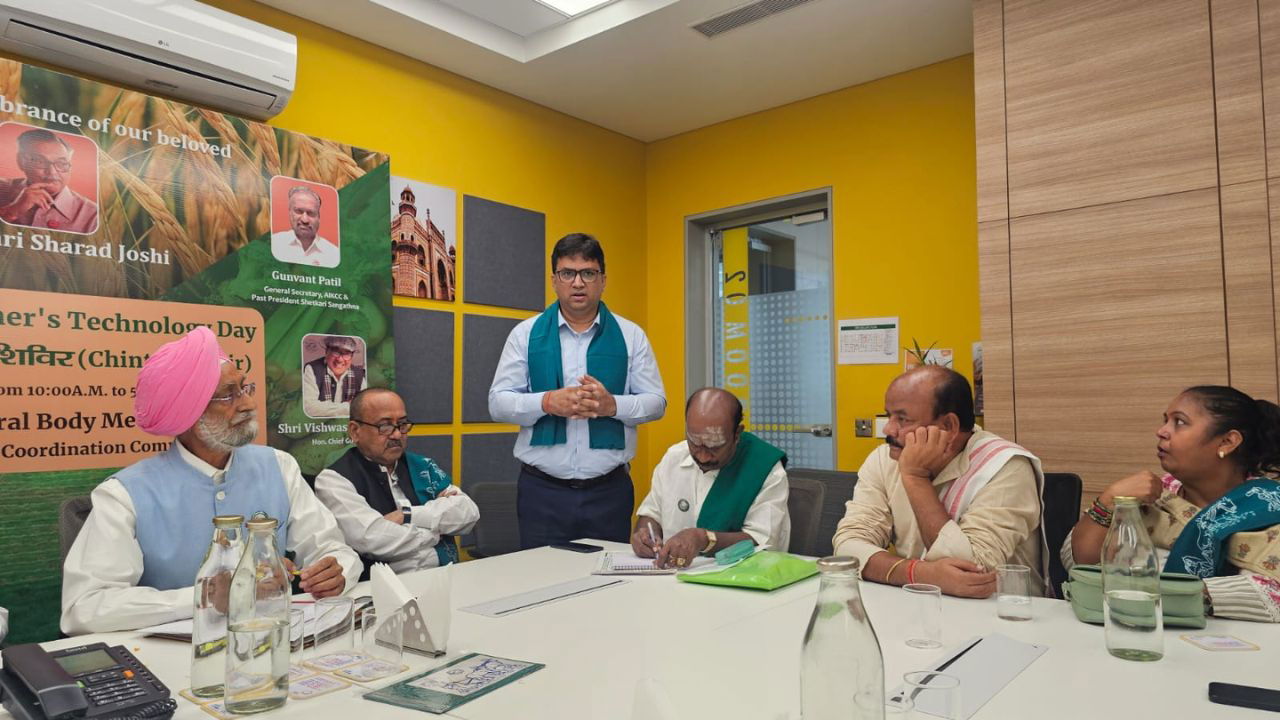
The All India Kisan Coordination Committee (AIKCC) on September 04, 2024, called upon Centre to urge various state governments to formulate a comprehensive ‘Agriculture Policy’ in the interest of farmers. It also called upon the policymakers at both the centre and state level to maintain policy consistency for a minimum period.
Addressing a press conference at the end of two-day Chintan Shivir held in the memory of the late Sharad Joshi in New Delhi, Bhupinder Singh Mann, Ex-Member of Parliament (Rajya Sabha) and Chairman of AIKCC said, “More than 60% of our population is dependent on agriculture for their livelihood. Many a times there is a conflict between centre and the state on various issues, but most of the states do not have an agriculture policy on their own. There is a dire need for state governments formulate a policy in this regard. Such a step will bring about policy consistency which is the need of the hour.”
“Policy changes at frequent intervals harm farmers the most and hence, it is important to maintain policy consistency. This will help in boosting agri exports as well,” Bhupinder Singh Mann.
AIKCC is working on this front and is meeting various farmers’ organisation and political leaders to push for this quest. Interestingly, AIKCC and its 29 state representatives led by Ex-MP Rajya Sabha Bhupinder Singh Mann has approached the Leader of the Opposition in Parliament, Rahul Gandhi, for a possible meet. The farmers’ organisation wanted to give a representation to the Leader of the Opposition, but Rahul Gandhi is yet to provide time for a meeting.
The two-day Chintan Shivir also brought together policymakers, technocrats, and farming leaders to examine the current challenges and opportunities in Indian agriculture, with an emphasis on technological innovation and policy reform.
Binod Anand, Vice Chairman of AIKCC, spoke about the strategic need for India to retain sovereignty over its agricultural data. He warned against outsourcing data management to foreign corporations, stressing that India must control its own agricultural future. Anand also pushed for the creation of a national agriculture value chain policy that would provide a fair market environment for farmers, ensuring that they receive the rightful Minimum Support Price (MSP). He further suggested a robust framework where 10,000 to 15,000 farmers from each region are mobilized to represent farmer interests, reducing the need for legal disputes that have long plagued India’s agricultural community.
Earlier during the 2-day Chintan Shivir, Bhupinder Singh Mann, Ex-Member of Parliament (Rajya Sabha) and Chairman of AIKCC, opened the discussions by acknowledging the hardships Indian farmers continue to face, especially in light of the constitutional and economic barriers that hinder growth. He highlighted that, despite technological advancements, farming in India is still in distress. With increasing corporate involvement in agriculture, Mann stressed the importance of ensuring that marginalized farmers, especially those from non-urban regions, are not left behind. He emphasized the need for a comprehensive national strategy to protect farmers’ rights to their land while facilitating easy access to advanced technologies that can drive efficiency and profitability in agriculture.
Gunvant Patil, General Secretary of AIKCC, questioned the Government and its various policy initiatives. He noted that a large portion of current agricultural data remains unreliable, often manipulated to control market prices. By embracing technology, India could leapfrog into a new era of precision farming, benefiting both farmers and consumers.
The event took a sobering tone as Manwant Singh, a farmer from Bihar, spoke about the challenges farmers in his state continue to face, despite its rich soil. Singh revealed that only six months of farming occur in Bihar, with the rest of the year lost to droughts or floods. The absence of a comprehensive, nationwide agricultural policy, coupled with financial instability, leaves Bihar’s farmers struggling. He urged the government to address the unique needs of farmers in each region and create policies that cater to their local realities.
As the event neared its conclusion, the house resolved to revamp its outreach and communication efforts, focusing on more farmer-centric roundtables and community-led policy discussions collaboratively. Jitendra Sharma, Chairman of CNRI; Vishwas Tripathi, Chairman of Rose Multistate Cooperative Society, Samvedna Verma, Co-Chairman of CNRI; Mrinalini Manohar, CEO of Plantitude; Kushi Ardhya, Founder & CEO, Tamaara Global; Advocate Dinesh Sharma, Past President of Shetkari Sangathna, and current President of Shetkari Sangathna, Lalit Bahare, delivered powerful messages on the importance of liberalization and a free market in India's agricultural sector.
Advocate Dinesh Sharma emphasized how foreign vested interests have long sought to control Indian markets, often at the expense of local farmers. He argued that by allowing multinational corporations to dominate agricultural inputs, technology, and even policy-making, India risks losing its agricultural sovereignty. This exploitation, according to Sharma, has kept Indian farmers poor and dependent on external forces, unable to achieve the financial independence and stability they deserve.
Sharma passionately advocated for the liberalization of India’s agricultural sector, which would open up more opportunities for farmers to engage directly with the market, reduce bureaucratic inefficiencies, and empower farmers to receive better prices for their produce. He explained that a free-market system would encourage competition, drive innovation, and ultimately benefit both the producers and consumers. Sharma closed by urging the government to dismantle outdated policies that have long held back the potential of Indian farmers and to put forth a vision where the farming community is empowered, not controlled by foreign or corporate interests.
The National Farmer's Technology Day - Chintan Shivir was not just a day of discussions but a clarion call for action. It brought to the forefront the need for India’s agricultural policies to be aligned with the realities of modern farming. The event ended with a shared sense of urgency—Indian agriculture must not only adapt to technological innovations but also protect its farmers’ rights, ensuring that the nation's largest workforce is prepared for the challenges of the future.
















